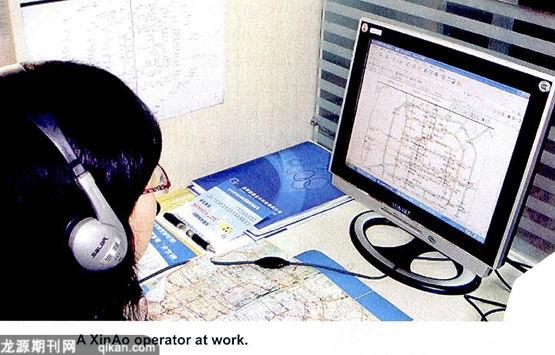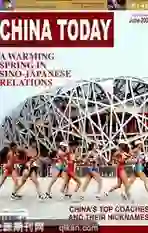Rolling Translators
2008-06-25staffreporterALEXANDERANDERSON
staff reporter ALEXANDER ANDERSON
THERE is a popular new term of art in Chinese business circles these days – “win-win.” Even to the uninitiated, the concept should be more or less self-explanatory. But in entrepreneurial parlance it refers to a mutually advantageous business model in which no cost is incurred by any of the participants, customers included, and in which all parties to the arrangement come away with a tidy profit.
Win-win for All
Assuming the deal is aboveboard and not some pyramid scheme, it is an elusive grail in even the most hospitable of business climates. In Chinas often uncharted economic waters, it can be an invitation to public skepticism.
Nevertheless, a British lawyer-turned-dealmaker, Richard Craig, and his Chinese partner, Lori Cheung, are convinced they have hit upon precisely such a happy formula. Just in time for the Olympics, they have unveiled a new rolling translation service, XinAo, that has already equipped some 10,000 of Beijings 67,000 taxis with a direct link-up to a bureau staffed by proficient, multilingual interpreters, all ready to come to the rescue of helpless newcomers who wouldnt know Baochao Hutong from Tiananmen Square.

“Its a natural,” says Craig. “Most taxi drivers are from the provinces,” Cheung explains, “so they are very unlikely to know any foreign languages. With our system, they just dial us up, and our interpreters can then communicate directly with the passenger.”
Right now the XinAo Translation Service Center provides services in English, Japanese, Korean and Russian, and, according to Cheung, two months before the Beijing Olympics people from the German-, French-, Italian-, Vietnamese-, Arabic- and Spanish-speaking worlds can also get their required language help at XinAo. “So far we only operate in Beijing. But, really, the skys the limit. Right now, were exploring the possibility of opening a center in Shanghai,” says Cheung.
The “win-win” aspect of the equation, Cheung says, rests with the fact that the taxi drivers are not charged for the service, and neither are their passengers. In accordance with an operating agreement concluded with the oil major Sinopec, which has more than 500 gas stations across the city, all that subscribing drivers need to do is agree to fill up exclusively at a Sinopec pump, and the company will foot the monthly subscription fee of RMB 30.
The system is a model of simplicity, and even the cost of the mobile connection forms an integral part of the bargain. When a subscribing driver, who has just picked up a flustered passenger, calls the translation center using an onboard device connected to his cell phone, his membership is instantly verified. The phone then self-disconnects within two seconds, and a friendly XinAo operator calls right back.
The translator handling the call is then able to communicate directly with the visitor to determine exactly where he or she needs to go, then relays the information back to the driver. As an added bonus, the service also provides drivers with up-to-the-minute traffic reports, and the operator, who continually scans a live feed of Beijings road conditions, is able to offer suggestions on optimal routes to take.
Ironically, that aspect of the service sometimes proves more valuable than even the language translation. “Often, the drivers dont necessarily know Beijing very well, and we can give them precise directions to get where they need to go,” says Cheung. “Our services, in fact, extend beyond translation to include any information requests that we can help find an answer to on the Internet,” he adds.
The palm-size devices, which are manufactured in Shenzhen, Guangdong Province, are distributed to participating drivers free-of-charge, and as long as they put at least 500 liters a month in their tanks at any Sinopec station – filling up being something they would need to do in any event – the oil giant pays their monthly membership fees. Win-win.
From Real Estate Law to Old China Hand
Richard Craig is a tall young man, just off a plane from Hong Kong, and so understandably scruffy when he sits down to explain the elegance of the XinAo concept. Until being bitten by the China bug some three years ago, he says, he practiced real estate law in England – a hard-charger by his own admission.
But when he first arrived, he spent six months simply traveling around China, gleaning insights from anyone who would speak to him. The result was a profound conviction that China is emphatically the place to be these days.
“I must say, this is a lot more exciting,” he quips. “I also run an export company, but when I heard about this deal, I didnt hesitate to invest in it myself.”
Lori Cheung, for his part, is a dapper businessman who exudes an entrepreneurial optimism typical of many of todays Chinese. He says he got the idea for XinAo while on a business trip to the Republic of Korea, where a similar service has been operating for some time. “I thought to myself, this would be perfect.”
The result of their union was the XinAo Translation Service Center, and since May 2007 it has been expanding at a dizzying pace. “The current number of subscriptions grows by as many as 100 per day,” says Cheung. Beijing has some 300 taxi services, and tens of thousands of cabs cruise the streets on any given day or night. The potential is admittedly something to contemplate.
The market is even greater when considering the large number of expatriates and their families in Beijing. “Any non-native speaker in Beijing can subscribe to our multi-language services for a monthly fee of RMB 30,” says Cheung – but this time Sinopec will not pay.
With some 500,000 foreign visitors expected to hit town for the Beijing Games in August, and more than 3 million who visit the city each year from all parts of the world, the translation – and information – service will likely prove a godsend to the majority of those who lack the basic Chinese language skills necessary to explain even in the simplest of terms where it is they wish to go, much less obtain any other useful information that might help them survive in an often bewildering city.
Of course, not everything has been smooth sailing. At first, Cheung often faced skepticism on the part of the taxi drivers themselves, who had to be persuaded that the service was in their interest. It was a task he worked at tirelessly, often visiting the enormous taxi park near Beijings international airport to press his case in person. Now, Sinopec helps promote XinAo as an affiliate program at 150 of its filling stations in the capital city, where taxi drivers can obtain a XinAo subscription card. So the fundamentals are solid, and the company can only grow. Craig says he can envision expanding into other services based on the same model, and who knows, maybe even take the company public one day. In China today, nothing is impossible.
But for now, he says, it is enough to accept the gratitude of this reporter, a hapless lost stranger three months ago, rescued in the dead of night by a helping hand that guided him home.
